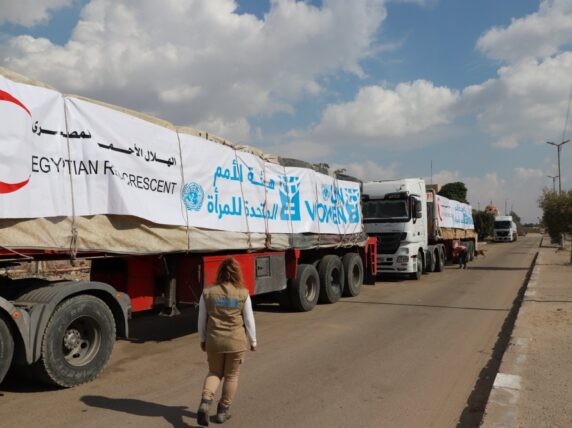Farewell to DFID: 10 key achievements from the last 23 years
Back in June, the prime minister announced that the Department for International Development (DFID) was to be merged with the Foreign and Commonwealth Office.
This weekend will see DFID close its doors, as the newly formed Foreign, Commonwealth and Development Office takes over the portfolio.
DFID leaves behind a strong legacy. Opening in 1997, the department has made a hugely positive impact around the world over the last 23 years. As we say goodbye to DFID, we have put together some of the department’s biggest achievements.
Girls education
DFID’s Girls’ Education Challenge (GEC) was launched in 2012 as a 12-year commitment to reach the most marginalised girls in the world. It is the largest global fund of its kind, solely dedicated to girls’ education.
The programme helps girls in some of the poorest countries, including girls with disabilities or those at risk of being left behind, receive a quality education. To date, Girls’ Education Challenge is supporting up to 1.5 million girls and young women to get access to quality education.
Through DFID, the UK is one of the largest donors to the Global Partnership for Education (GPE) – a partnership and fund that helps some of the most vulnerable and marginalised people gain a quality education. DFID is also a founding member of the Education Cannot Wait Fund that seeks to provide children with an education during times of emergency, conflict and displacement.
Maternal health and family planning
Between 2011-2015, the UK aid agency invested £1.3 billion on family planning, reproductive healthcare, and maternal and neonatal health. DFID also hosted two international pledging conferences in 2012 and 2017.
At the 2017 London Family Planning Summit, the UK brought together 65 donors and organisations from across the world to agree on a set of commitments, promising an additional £45 million toward family planning every year until 2022. Between April 2018 and March 2019, 23.5 million women and girls have been supported to use modern methods of family planning with the help of DFID.
Life-saving humanitarian assistance in crises
From 2015 to March 2019, DFID reached 32.6 million people with humanitarian assistance. At least 10 million of the people reached were women and girls coping with the most dire of crises across the world.
Subscribe to our newsletter
Our weekly email newsletter, Network News, is an indispensable weekly digest of the latest updates on funding, jobs, resources, news and learning opportunities in the international development sector.
Get Network NewsMore recently, DFID has played an important role responding to the devastating humanitarian crises in Syria, Yemen, DRC, Bangladesh and Afghanistan, providing access to clean drinking water and sanitation, food assistance, nutrition, protection, shelter or non‑food items, cash, and health services.
In Yemen, from April 2019 to March 2020, DFID provided over 400,000 children, and pregnant and breastfeeding women with nutrition interventions.
Eradicating polio
DFID has been at the forefront of the global fight against polio through its support to the Global Polio Eradication Initiative (GPEI). To date, the initiative has prevented over 18 million people from being paralysed by polio.
The UK is one of the biggest funders of GPEI and very recently, the UK committed £400 million to the Global Polio Eradication Initiative (GPEI) between 2013-20. This initiative has vaccinated more than 400 million children against polio every year while monitoring 70 countries for any cases. In 2019, it was announced that the UK would be recommitting to GPEI from 2020-2023 to help pay for tens of millions of polio vaccines.
As was announced this week, Africa is now free of wild polio. This incredible achievement was made possible by the thousands upon thousands of healthworkers and volunteers working across the continent, with help and support from donors like DFID.
Banning land mines
When DFID was launched in 1997, one of their first notable achievements was a complete ban on the manufacture, transfer, import and export of anti-personnel landmines. The pledge came off the back of Princess Diana’s visit to Angola with the Red Cross.
Clare Short, then secretary of state for development, announced that UK funding for landmine clearance would be doubled to £10 million, and would be used to support and train local people to do their own clearance later that year.
Helping fragile and conflict affected states
In 2008, DFID’s secretary of state Douglas Alexander pledged that 50% of bilateral aid would go to vulnerable and conflict affected countries, stating that “responsibility to the poor was a matter of justice, not charity.“
It was an important move, and has been matched or increased by the ensuing governments. The pledge has led to more support reaching the most vulnerable people across the world.
Safeguarding
DFID has played a critical role in supporting action across the aid sector to drive up standards on safeguarding against sexual exploitation and abuse and sexual harassment (SEAH). The UK‑hosted the 2018 International Safeguarding Summit, which brought together NGOs, multilateral organisations, private sector suppliers, donors, governments, survivors and victims, parliamentarians, independent experts, and law enforcement agencies to help come up with practical solutions.
DFID also helped secure agreement amongst the world’s 30 major global bilateral donors to adopt the DAC recommendation on ending SEAH. A project with Interpol has begun to strengthen criminal record checks and information sharing between law enforcement agencies and aid sector organisations. DFID has also supported the development and rollout of the Misconduct Disclosure Scheme.
The Millenium Development Goals (MDGs)
In 2000 we saw the launch of the MDGs, adopted by 189 nations, with specific targets set to reduce poverty and improve the lives of marginalised people around the world. DFID played a critical role in shaping the goals and then working to deliver them.
Despite uneven achievements and some shortfalls, the MDGs showed that with targeted interventions, sound strategies, adequate resources and political will, even the countries can make dramatic and unprecedented progress, paving the way for the Sustainable Development Goals in 2015.
Transparency
The ability to scrutinise how UK aid is spent and how it delivers impact for the world’s poorest people has played an important role in ensuring UK aid is traceable and delivered to a high standard, in order to to help marginalised communities around the world.
In 2011, DFID launched the Independent Commission for Aid Impact, an independent body responsible for the scrutiny of UK aid, for the first time published information on how all UK aid over £500 is spent, and implemented the UK’s Aid Transparency Guarantee, taking transparency and scrutiny to new levels.
DFID’s commitment to the transparency agenda has meant it has consistently reached the highest rating since the index was started by Publish What You Fund. The index is the only independent measure of aid transparency among the world’s major development agencies, assessing how well donors disclose information on their aid spending.
Disability inclusion
Since 2014, DFID has been working hard to make disability inclusion the norm across its programming. DFID has been widely recognised as one of the main actors promoting disability in the global development agenda in 2020.
The Global Disability Summit in 2018 played an important role in highlighting disability rights worldwide and resulted in 171 commitments made by governments, multilaterals and other organisations. DFID also launched its first Disability Inclusion Strategy that year.
DFID has also played an important role supporting the government of Pakistan’s plan to improve access to government schools and quality education for over 35,000 children with severe disabilities in Punjab. And in Ethiopia, DFID began supporting the development of 212 Inclusive Education Resource Centres, which have enrolled an additional 9,750 students with disabilities.




